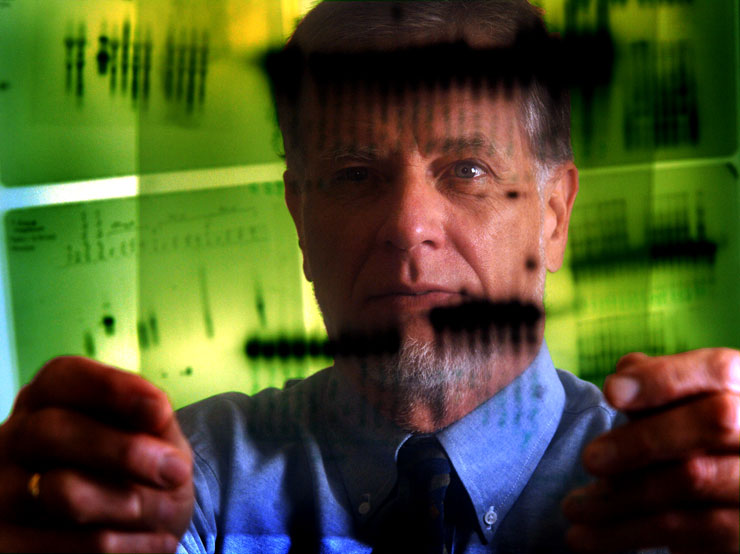
Photo courtesy of the University of Tennessee College of Veterinary Medicine.
David Brian ’64 is pictured in his laboratory at the University of Tennessee, where he dedicated his career to researching coronavirus. He died in 2014, shortly after his retirement.
Before it upended their lives, most Americans had never heard of coronavirus.
For Manchester University graduate David Brian ’64, coronavirus was his life’s work.
“Some of the methods of studying coronavirus that he developed are probably helping the people who are working on the vaccines for COVID-19,” said Donna Garver Brian ’65, of her husband, who spent his career in research at the University of Tennessee. “Dave was one of the very first people who got into it,” she said. His coronavirus research also contributed to the understanding of severe acute respiratory syndrome (SARS) during that epidemic in 2002 and 2003.
The oldest of six children, David Brian grew up on a farm near Brethren, Mich. “He was such a hard worker,” recalled Donna. The farm was not prosperous and “he remembered going barefoot in the summer so they’d have money for shoes in the fall.”
David arrived at Manchester in the fall of 1960 and majored in biology because he wanted to be a physician. His public school district in rural Michigan had been poor, however, and did not prepare him well for college. “David struggled at Manchester,” says Donna.
Without strong enough grades to get into medical school, David opted for veterinary school instead and, after being wait-listed, he got into Michigan State University College of Veterinary Medicine.
His time in East Lansing changed his life.
Strengthened in part by his Manchester experience, David graduated third in his class from the Michigan State College of Veterinary Medicine. He discovered his calling in research, rather than veterinary practice, and stayed at MSU to add a Ph.D. in molecular virology to his credentials.
When the University of Tennessee opened its veterinary school in Knoxville in the mid-1970s, David was the first regular faculty member hired. With a joint appointment to the veterinary school and the UT Department of Microbiology, David led development of the virology curriculum for veterinary students and established his own virology research lab at UT.
“Coronavirus was important at that point, but there wasn’t very much known about it, so it was a beginning field,” said Donna. “When he started out he was studying diarrhea in baby pigs that was caused by coronavirus.”
Through the years, David established himself as a highly respected and much-published research scientist focusing on the medically important coronavirus family. In 2003, he was at the forefront of the international scientific community efforts to understand SARS, and his research aided the Centers for Disease Control and Prevention in identifying the SARS virus as a coronavirus.
Brian also spent a lot of time writing grants, said Donna, and his research was continuously funded by multiple agencies such as the Centers for Disease Control and National Institutes of Health. His research was internationally recognized and he was a 23-year member of the Coronavirus Study Group, the Subcommittee of the International Committee on Taxonomy of Viruses. In addition, he presented two state-of-the art lectures at annual meetings of the American Society for Virology. Find a link to his publications here.
When David died in 2014, only several months after his retirement, The University of Tennessee remembered him “as an esteemed colleague and a wonderful mentor” to the many graduate students who worked in his laboratory.
“David didn’t talk about his research in depth to me because I didn’t have a science background,” said Donna. However, both Brians shared a hospitality for David’s graduate students and enjoyed having them over for international dinners. The students came from countries around the world, including India, Taiwan, Switzerland, and Turkey. “David would buy the groceries,” Donna said, "and the students would teach him how to prepare their native dishes.” He also liked to call his students "Doc," recalled Donna, to remind them that their efforts would lead to a doctoral degree.
A native of Decatur, Ill., Donna met David while they were students at Manchester. “We just absorbed Manchester,” said Donna, referring to not only their classes, but the values, people and influence of the Church of the Brethren.
A music major, Donna taught music for several years while David was in graduate school. When the Brians adopted their children, Matthew and Molly, Donna stayed home to raise them.
Later on, she enrolled at UT and earned her doctoral degree in curriculum development. She enjoyed a career in adult education, some of it funded through a grant from the National Institute for Literacy, before she retired.
Today, Matthew is a real estate developer of affordable housing in New York City and Molly is a nurse at East Tennessee Children’s Hospital in Knoxville. Donna remains in Knoxville and enjoys time with Molly, who lives nearby, and two grandchildren.
By Melinda Lantz ’81